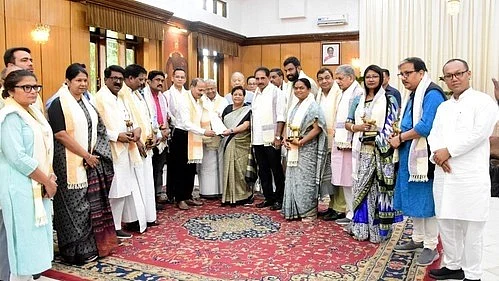Violence will have long-lasting psychological effect on Manipur children: NK Premachandran
RSP leader and Kerala MP NK Premachandran was part of the 21-member multi-party delegation of Opposition MPs who went for a two-day visit to Manipur

"The psychological trauma of having lived through the deeply polarising ethnic violence in Manipur will have a deep-rooted effect on the mental state of people, especially children," said Revolutionary Socialist Party leader and Kerala MP NK Premachandran. There is despondency all around to see.
He was part of the 21-member multi-party delegation of MPs of the Opposition’s Indian National Developmental Inclusive Alliance (I.N.D.I.A.) who went for a two-day visit to Manipur to understand the ground situation and suggest recommendations to both the government and Parliament.
This visit has come as Manipur has been embroiled in an ethnic strife primarily between the Kuki-Zo people and the Meiteis since May 3. At least 150 people have been killed and over 70,000 have been displaced so far. The clashes broke out after a "Tribal Solidarity March" was organised in the hill districts on May 3 to protest the Meitei community's demand for Scheduled Tribe (ST) status.
The delegation, which was divided into two groups of 10 and 11 each, visited four relief camps in total, each group visiting two camps each. The groups visited camps of both the Kukis and Meiteis. Premachandran was part of the group which visited the camps in Churachandpur and Imphal. The other team visited camps in Imphal and Moirang in Bishnupur district.
The groups visited the Kuki-Zo relief camp in relief camp at the Churachandpur College Boys’ Hostel and Churachandpur’s Don Bosco School and later the Meitei camp at Imphal’s Ideal Girls’ College and Moirang College in Bishnupur district.
“The pathetic condition of the people in the camps will haunt us for long. Children are growing up in these camps. They have already been in these camps for almost three months. They will remember the scarcity of food and unhygienic conditions around them. Students are missing school and college classes. There are very few toilets in these camps. There’s hardly any medical help available. All of those in these camps will require medical and psychological help. The trauma of upended lives will last long,” underscored Premachandran.
In addition to this, there is absolutely no privacy in these camps. “Men, women and children are all together under one roof. When lives are at stake, it may seem odd to think of this, but effects of being cooped up together will have a lifelong impact. There is, of course, some solace that comes from people being together as that reduces some fear,” added Premachandran.
There were several young students in the two camps that he visited who said that they did not know what future holds for them. Several of the Kuki students were studying in Imphal as the hill districts do not have facilities for higher education. Imphal Valley is dominated by Meiteis and the surrounding hill districts are where most of the Kuki-Zo tribes reside.
“We met several Kuki students who were studying medical courses including MBBS at the Imphal-based Regional Institute of Medical Sciences (RIMS). They are all afraid to go back to the capital for fear of losing their lives and attacks. They have missed several classes and online classes do not help for such courses. Moreover, there has been internet shutdown too,” highlighted Premachandran.
The MP from Kerala’s Kollam district questioned how the people in these camps were expected to restart their lives when the situation on the ground in not conducive for normalcy. “The people in the camps were living good lives and now they have lost everything — homes, cattle, money, certificates. The government in the state is not trusted by either sides and they aren’t doing anything either to reduce the conflict,” said Premachandran.
The MP underlined that the division between the two ethnic groups was almost complete. Peace, he believes, cannot be restored immediately as there is complete mistrust. It will have to be a gradual, political process where both sides learn to trust. “That seems impossible currently. Meiteis and Kukis distrust both the state and central government. There is an aversion towards the central forces. Each side believes that the armed forces have been partial to the opposite side,” said Premachandran.
Several women spoke of their harassment and assault mostly to the women MPs. “The stories that we heard were gut-wrenching and we felt helpless. We can highlight their issues to the government and Parliament. This is why we want a discussion as lives are at stake. We also submitted a memorandum to the state governor Anusuiya Uikey,” explained Premachandran
While submitted the memorandum on what they saw to Uikey, the 21 MPs stated that the state machinery has completely failed to handle the situation and both the state and union governments were responsible for the escalation of the ethnic violence between the two communities. They sought rehabilitation of the affected people and asserted that there was a sense of alienation among all sections of the society that needed to be addressed. The governor had reported asked the all-party delegation to talk to people to remove mistrust among communities.
Follow us on: Facebook, Twitter, Google News, Instagram
Join our official telegram channel (@nationalherald) and stay updated with the latest headlines
